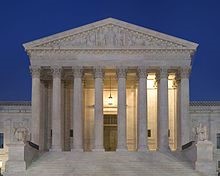By Jennifer Gilroy
To listen to the news you would think the U.S. Supreme Court was concerned only with Second Amendment rights in hearing oral arguments last Monday. But they actually saved some energy for a vigorous discussion about copyrighting the annotations to state statutes.
As we explained in LegiSource in April of 2017 (it takes a while for a case to wend its way from the trial court to the U.S. Supreme Court),  while the text of the statutes is not copyrightable, most parts of the federal and state codes are accompanied by “ancillary works” such as editor’s notes, source notes, and, most substantively, annotations that summarize appellate court cases interpreting the statutes. Up to now, most states have routinely filed a copyright on these writings, recognizing them as original, individual expressions that have a “modicum of creativity” (the general standard for copyrighting material). But now, the assumption that these writings are copyrightable is called into question.
while the text of the statutes is not copyrightable, most parts of the federal and state codes are accompanied by “ancillary works” such as editor’s notes, source notes, and, most substantively, annotations that summarize appellate court cases interpreting the statutes. Up to now, most states have routinely filed a copyright on these writings, recognizing them as original, individual expressions that have a “modicum of creativity” (the general standard for copyrighting material). But now, the assumption that these writings are copyrightable is called into question.
Our earlier article explained that the State of Georgia sued Public.resource.org (PRO) after it purchased a copy of the Official Code of Georgia Annotated (OCGA) and posted it, in its entirety, online. Georgia claimed this posting infringed on Georgia’s copyright of the annotations.[1] As explained in the earlier article, Georgia successfully defended against PRO’s motion for summary judgment in the case pending before the District Court for the Northern District of Georgia. The District Court determined that the Georgia statutory annotations are, in fact, original works entitled to broad copyright protection.
PRO, an organization whose mission is to increase access to government materials, appealed that ruling to the U.S. Court of Appeals for the Eleventh Circuit (Eleventh Circuit). The question before the Eleventh Circuit was whether it should treat the annotations in the OCGA in the same manner under copyright law as a legislative enactment or a judicial opinion. It is uncontested that legislative enactments and judicial opinions are not copyrightable because they represent the exercise of sovereign power. Because they are written by the People’s representatives, they are in effect written by the People and are therefore part of the public domain. This policy is referred to as the government edicts doctrine.
In October of 2018, the Eleventh Circuit observed that the issue before it was a “close one,” acknowledging that there were important considerations of public policy at stake on both sides. Ultimately, however, it concluded that the annotations in the OCGA were sufficiently “law-like” to be regarded as a sovereign work and therefore not copyrightable. In reaching this conclusion, the Eleventh Circuit stated that: The annotations clearly had authoritative weight in explicating and establishing the meaning and effect of Georgia’s law; the procedures by which the annotations were incorporated in the OCGA bore the hallmarks of legislative process, namely bicameralism and presentment; and Lexis, with which the Georgia Code Revision Commission contracted to draft the annotations, did so pursuant to highly detailed instructions set out in the contract.
Last March, the state of Georgia petitioned the United States Supreme Court (the Court) for a writ of certiorari, posing the question whether the government edicts doctrine extends to, and thus renders uncopyrightable, works that lack the force of law such as the annotations in the OCGA. The Court granted Georgia’s petition. Over the spring, summer, and fall, there were 33 amicus briefs filed. The amicus brief filed by Lexis even included a citation to the April 2017 LegiSource article. After the briefing schedule concluded, the Court heard oral arguments on December 2nd. We anxiously await the Court’s ruling likely sometime before June next year.
However, as explained in the previous article, the outcome of the case will not directly affect Colorado. In 2016, the Committee on Legal Services suspended the practice of copyrighting the annotations to the Colorado Revised Statutes. The Committee recognized that, unlike most states, Colorado’s nonpartisan staff in the Office of Legislative Legal Services writes the annotations. Because the annotations are the product of state-paid legislative staff and are made freely available on the Colorado General Assembly’s public access website, the Committee decided a copyright was not appropriate.
[1] For purposes of this case, “annotations” includes “history lines, repeal lines, cross references, commentaries, case notations, editor’s notes, excerpts from law review articles, summaries of opinions of the Attorney General of Georgia, summaries of advisory opinions of the State Bar, and other research references.”
